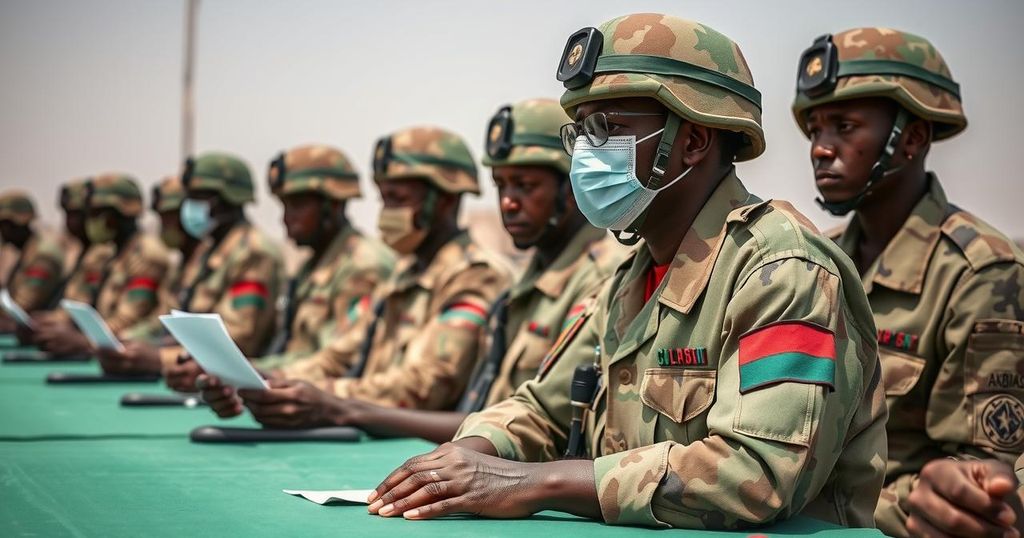Chad Elections: Military Protection Sought Amid Rising Political Tensions
Chad’s election officials have sought military protection due to rising violence ahead of the Dec. 29 elections, exacerbated by opposition disruptions to ruling party activities. With over 8.3 million registered voters, the electoral process faces allegations of manipulation by the ruling Patriotic Salvation Movement, prompting concerns over fair governance and the potential for further conflict amid a turbulent political climate.
Chad’s electoral commission, known as the National Election Management Agency (ANGE), has requested military assistance to safeguard election officials and candidates as the country approaches the Dec. 29 elections. Increased violence has marred the electoral process, with opposition supporters reportedly utilizing clubs and iron bars to disrupt rallies by the ruling Patriotic Salvation Movement (MPS) party in various locations. Election campaigning has been characterized by multiple assaults and disruptions, highlighting tensions in the lead-up to the elections, which aim to conclude the three-year transitional phase following the April 2021 death of long-standing President Idriss Deby Itno.
Vice President of ANGE, Assane Bairra, has expressed concerns that without military intervention, the situation could escalate into armed conflict. The election is critical, with over 8.3 million of Chad’s approximately 18 million populace registered to vote amidst the plans of nearly 180 political parties and about 1,300 candidates contesting in the parliamentary elections. Furthermore, the government has accredited over 1,000 election observers to facilitate the electoral process. However, a coalition of over 75 opposition parties has denounced the elections as a “masquerade,” alleging that President Mahamat Idriss Deby Itno is intent on using the polls to solidify his power, furthering the dynasty established by his father.
The political landscape remains volatile as opposition factions have reported instances of aggression against MPS campaign caravans across several towns, including Ndjamena and Moundou. In response to these clashes, the military has taken steps to dismantle roadblocks put in place by opposition supporters to impede the MPS’s campaign efforts. Chad’s Party of Democrats, led by Avocksouma Djona, has called for a postponement of the elections, raising concerns about the electoral management’s legitimacy, primarily due to its ties to the previous regime.
The electoral management bodies, appointed by President Deby, are under scrutiny, as he has instructed Chad’s constitutional court to declare the MPS victorious in upcoming elections, raising alarms about the electoral integrity. While President Deby has reassured the public that the elections will be conducted fairly and transparently, opposition groups have swiftly rebuffed these claims, positing that the regime’s desire to retain parliamentary control undermines the electoral process. Deby, who assumed power following the death of his father and was elected in May, has extended the promised transition period, further complicating Chad’s path to civilian governance.
Chad has been navigating a transitional period following the death of Idriss Deby Itno in April 2021, which ended his 30-year rule. The transitional government, now led by Mahamat Idriss Deby Itno, pledged a return to civilian governance, yet challenges persist. The country has not held a civilian-led election since Deby’s death, and recent unrest has raised questions regarding the legitimacy and safety of the upcoming electoral process. The involvement of military forces highlights concerns over political stability and public safety during this critical time in Chad’s political trajectory.
In summary, the plea for military support by Chad’s electoral commission amidst rising tensions underscores the precarious nature of the political landscape ahead of the Dec. 29 elections. The ongoing confrontations between opposition supporters and the ruling party, combined with allegations of electoral manipulation, raise significant concerns regarding the integrity and fairness of the electoral process. Without clear resolutions to these issues, Chad’s transition to civilian rule remains in jeopardy, potentially perpetuating instability in the region.
Original Source: www.voanews.com




Post Comment